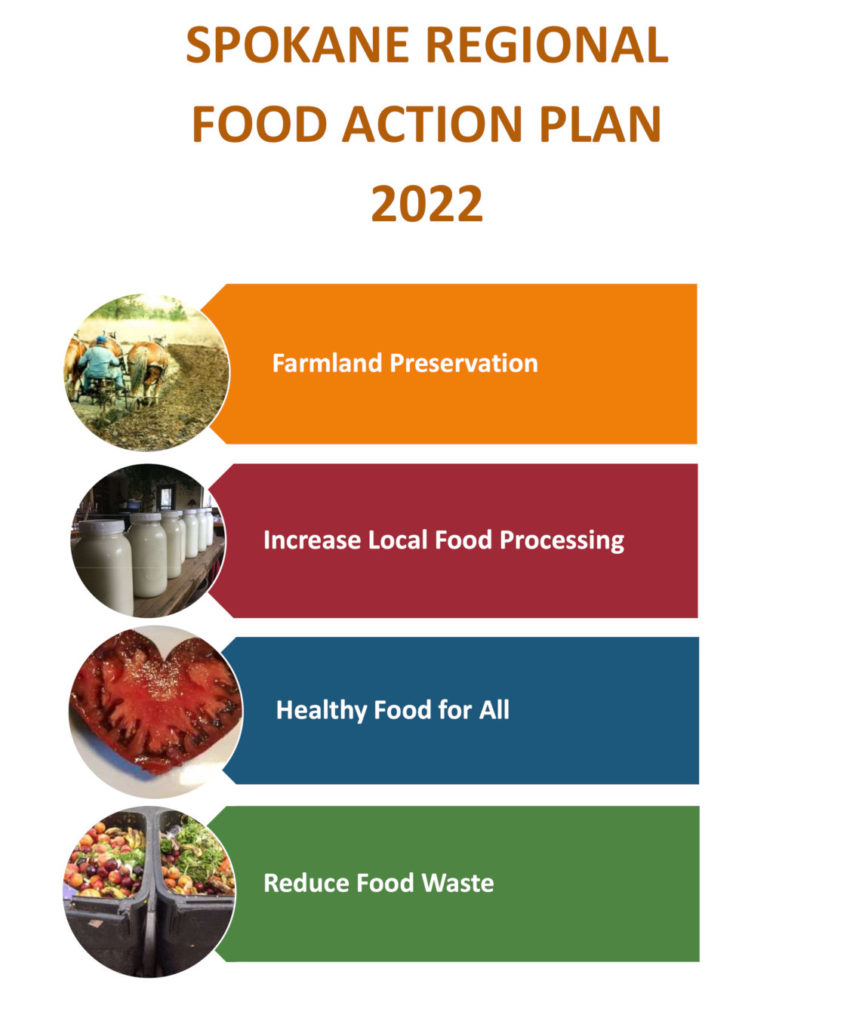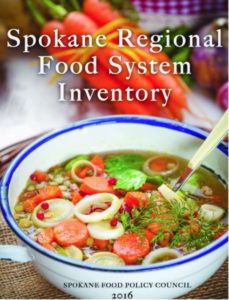Main Content
What is a Food Policy Council?
A Food Policy Council (FPC) coordinates food system players in the food system within a given geographic/jurisdictional boundary. The food system is made up of growers, processors, distributors, retailers, consumers, and composters. Food Policy Councils range from municipal, county, regional, or state levels of governance. Put another way, “The central aim of most Food Policy Councils is to identify and propose innovative solutions to improve local or state food systems, spurring local economic development and making food systems more environmentally sustainable and socially just,” says Mark Winne, a community food activist who has been referred to as the ‘father of food policy work.’
 On Monday, May 16th, 2022, the Spokane City Council voted unanimously on a resolution to support the Spokane Food Policy Council’s recently-completed Spokane Regional Food Action Plan.
On Monday, May 16th, 2022, the Spokane City Council voted unanimously on a resolution to support the Spokane Food Policy Council’s recently-completed Spokane Regional Food Action Plan.What is the Spokane Regional Food Action Plan?
The Spokane Food Policy Council is pleased to publish the Spokane Regional Food Action Plan. After completion of a food policy audit, more than 350 food system stakeholders informed the plan by responding to a community food system survey and participating in three community forums in 2020. Participating food system stakeholders included producers, processors, distributors, consumers, and waste managers. Thank you to everyone who informed this important work. We look forward to continuing to build these relationships as we implement the Regional Food Action Plan.
The Spokane Food Policy Council identified four priorities for our regional food system:
• Farmland Preservation,
• Increasing Local Food Processing,
• Healthy Food for All and
• Reduction of Food Waste.
The four priorities outlined in the Regional Food Action Plan will enhance community health through the following actions:
- • Preserving farmland, recruiting new farmers, and increasing local food production.
- • Advocating for policies that enable residents and businesses to make and process their food locally.
- • Providing broader access to high-quality food and disseminating better food and education to empower people to make healthier choices for themselves and their families.
- • Reducing food waste through gleaning, redistribution and composting to support food security and the environment.
To learn more about the strategies and recommendations to address these four priorities, please refer to the plan document which is available online.
The COVID-19 pandemic and climate change demonstrate the fragility of our current food system. Accordingly, both the state and federal government recognize the need to support a revitalization of regional food systems and are focusing much of the post-pandemic rebuilding on addressing food system issues. Federal, state, city, and local stakeholders show interest in advancing equity in our food system. This can be seen by efforts to address food security in historically underserved communities and prioritizing health, business and asset-building for Black, Indigenous, People of Color (BIPOC). A coordinated community effort is needed to further these efforts by supporting the Spokane Regional Food Action Plan.
The Spokane Food Policy Council will hold community meeting and form partnerships to work on identified food issues. We look forward to working alongside leaders in our region’s food system. Our partners are essential in addressing the plan’s priorities: Farmland Preservation, Increasing Local Food Processing, Healthy Food for All, and Reducing Food Waste. Please contact us to share your thoughts and learn more!
Email: [email protected]
About the Spokane Food Policy Council:
The Spokane Food Policy Council, established in 2013, is comprised of local stakeholders including representation from Spokane Regional Health District, Second Harvest, Catholic Charities, Washington State University Extension, SNAP-Ed, farmers, ranchers, regenerative agriculturists, academia, local business owners and food service workers. Members volunteer and bring expertise from various areas of the regional food system and collaborate to improve our local food system for all. The Food Policy Council is an independent 501(c)(3) non-profit organization.
The Food Policy Council serves all people by focusing our work on growing equity through our regional food system. We strive to recruit council members who represent diverse populations and have lived experience with food insecurity or are subject-matter experts in their respective field. Importantly, we also partner with organizations who serve disproportionately impacted people, and the Food Policy Council serves as a conduit to elevate their voices and solve the problems we know people are experiencing now, as well as plan for predictable future crises, and ensure decision-makers are made aware of policy-change solutions
The Food Policy Council advocates for policies and strategic investments in the local food system that will result in greater prosperity and better public health outcomes throughout our community.
Our Mission
To advance policies and initiatives that foster a resilient food system in the Spokane area; one that is healthy and equitable for its citizens, economy and environment.
Our Vision
A thriving community that values and cultivates a viable, inclusive, and prosperous food system.
Recent Posts
- Spokane Food Policy Council Mini-Grant Application October 10, 2023
- Contact your State Legislators: Support the Sustainable Farms and Fields Program. February 6, 2022
- Letter of Support for the City of Spokane’s draft Sustainability Action Plan August 23, 2021
Purpose of Food Policy Councils
- Influence government food policies
- Coordinate food system stakeholders within a specified geography/jurisdiction
- Conduct food assessments/studies and prepare food plans
Get Involved
The Spokane Food Policy Council meets the third Wednesday of each month. We are actively recruiting for Council membership, so please submit an application if you would like to get involved! You may also apply to volunteer on one of our working committees.
Outcomes
- Viable – Ensure Stewardship of natural resources while supporting a healthy food system
- Inclusive – Ensure all people are able to participate in the food system in a healthy, equitable and culturally relevant manner
- Prosperous – Ensure strong economic opportunities throughout the food system



